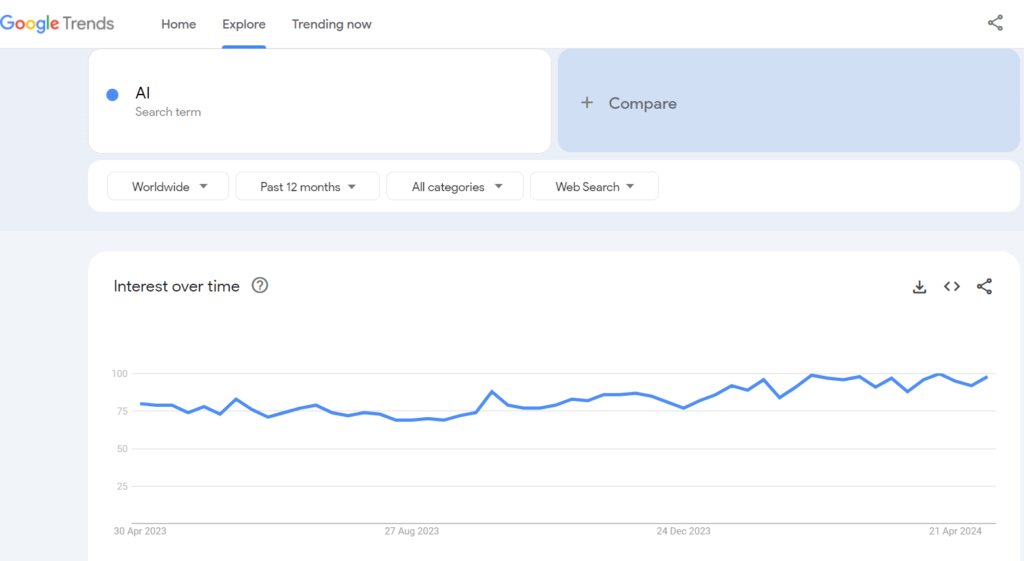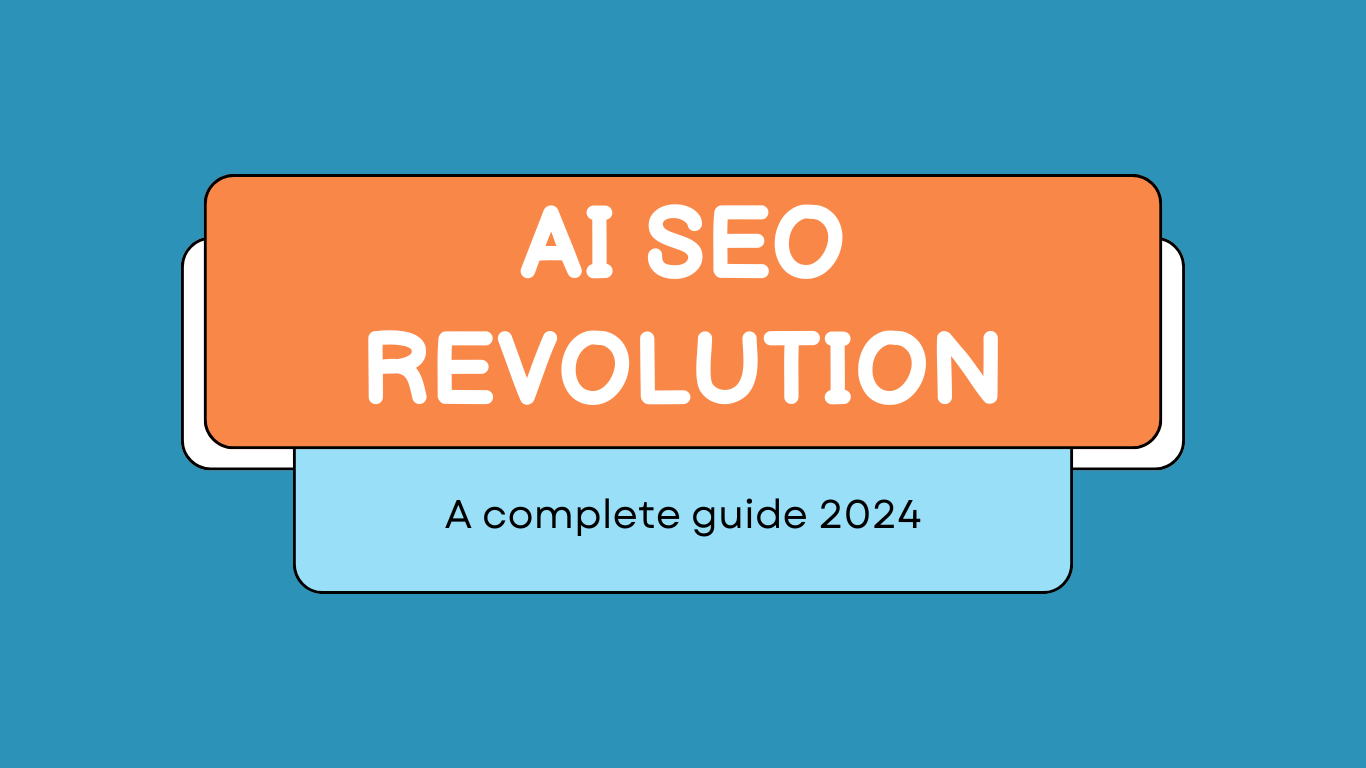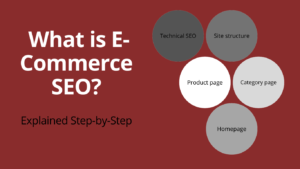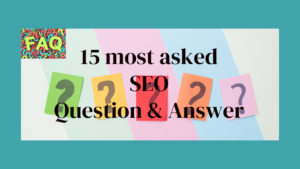In the vast digital landscape, where algorithms evolve faster than a hummingbird’s wings, mastering Search Engine Optimization (SEO) is no longer a mere choice—it’s a survival skill.
But what if I told you that the future of SEO lies not in keyword stuffing or link-building gimmicks, but in the land of Artificial Intelligence?
Imagine a world where your website effortlessly climbs the ranks of search engine results, effortlessly connecting with your target audience and driving unparalleled organic traffic. This isn’t just a fantasy – it’s the reality that AI SEO brings to the table.
Are you ready to revolutionize your SEO strategy and take your website to new heights? The future of search starts here –
What is AI?
Ever wished your computer could think like you do? That’s where AI steps in – it’s like giving machines a brain of their own!
Artificial Intelligence (AI) is like giving computers a brain. Instead of just following instructions, AI can think and make decisions. It learns from experience and gets better over time.
AI isn’t just one thing – it’s a whole toolbox of smart tricks. From learning from examples (like a really fast learner) to understanding languages and images (yep, it can see and talk!), AI does it all.

📈 As you can see, the graph is on a steady climb, reflecting the explosive growth of AI technologies across industries worldwide. From transforming healthcare to revolutionizing finance, AI is everywhere – and it’s only getting bigger!
How does AI and SEO intersect?
AI, or artificial intelligence, acts as the brains behind the operation, analyzing user behavior and preferences to understand what people are searching for. SEO, or search engine optimization, is like the muscles, working to make sure websites show up at the top of search results for those queries.
When AI and SEO intersect, it’s like they’re speaking the same language. AI helps SEO understand what users want, so SEO can create content that matches those needs. It’s all about making sure your website shows up when people are looking for something specific.
But it’s not just about understanding – it’s also about improving. AI helps SEO predict trends and topics that people will be interested in, so SEO can create content that stays ahead of the curve.
How AI algorithm impact search engine ranking, user experience and content discovery
Remember the days when SEO was all about jamming keywords into your website like a sprinkle-crazy baker?
Yeah, those times are over.
Today’s search engines are powered by fancy AI algorithms, and these clever bots are shaking things up for the better. But what exactly does this mean for you, the regular internet user (or website owner)?
AI Doesn’t Just Look for Keywords, It Gets Your Intent
Forget keyword stuffing! AI is way smarter than that. These algorithms can actually understand the meaning behind your searches and what you’re really looking for.
They don’t just count keywords, they analyze the connections between words and ideas to deliver the most relevant results possible.
This means you get search results that are actually helpful, not just a jumble of websites with the right keywords stuffed in.
AI keyword research and optimization
It is very hard and confusing to get your website seen online. AI helps you find the best keywords, to be seen in top ranks. Let’s see how AI makes SEO easier and gets your website noticed!
Here’s how AI makes keyword research:
Understanding what people really want: Imagine AI as a mind-reader for search engines. It analyzes what people are truly looking for when they type in a query.
This is called Natural Language Processing (NLP), and it helps you target keywords that resonate with your audience, not just random phrases they might use.
Finding Hidden Keywords: Think of AI as a magic search tool! It finds hidden keywords with less competition, attracting the perfect visitors to your site. It’s like a secret SEO shortcut!
Not Keyword Overload: Remember those websites that read like robots wrote them, overloaded with awkward keywords?
AI helps you avoid that mess. It analyzes your content and suggests relevant keywords that you can sprinkle in naturally.
This makes your site more discoverable for the right searches, all without sounding like a robot wrote it.
Transforming Content Creation and Personalization
Artificial Intelligence (AI) is a game-changer in the content creation. AI-powered tools can generate high-quality blog posts, product descriptions, and other textual content.
1. Input Keywords and Topics: Start by feeding relevant keywords and topics into an AI content generator. These tools use advanced natural language processing (NLP) to catch the context and intent behind your input.
2. Content Generation: The AI processes your input and generates text based on vast amounts of data and language patterns. This results in well-structured and coherent content, whether it’s a brief product description or an in-depth blog post.
3. Editing and Optimization: While AI produces a strong initial draft, human editing is essential to ensure the content aligns with your brand voice and is free of errors.
Enhance the content further by integrating SEO best practices, like using relevant keywords, adding internal links, and crafting compelling meta descriptions.
Content Personalization with AI
Personalizing content means modifying it to meet the unique needs and preferences of individual users. AI algorithms excel at this by analyzing user data and behavior.
1. Data Collection: Gather data on user behavior, preferences, and interactions with your content. This includes browsing history, search queries, and purchase history.
2. User Segmentation: Use AI to segment your audience into distinct groups based on the collected data. This helps you understand different user personas and their specific content needs.
3. Personalized Content Delivery: AI algorithms can customized content for each user segment. For instance, an AI system can recommend blog posts or products that match a user’s past behavior, thereby increasing engagement and conversion rates.
4. Continuous Improvement: AI systems continually learn and improve. By analyzing user interactions over time, they can refine personalization strategies, offering increasingly relevant content.
Technical SEO and Automation
SEO isn’t just about compelling content! Technical SEO ensures your website’s “behind-the-scenes” is optimized for search engines. It is crucial for ensuring search engines can efficiently crawl and index your website. AI technologies enhance this process, focusing on essential technical elements like structured data, schema markup, and canonical tags.
Structured Data and Schema Markup: Structured data and schema markup help search engines understand the content on your site. By using AI tools, you can automate the implementation of schema markup, ensuring that your content is properly categorized and displayed in search results.
AI can identify the most relevant schema types for your pages, making it easier to add rich snippets, star ratings, and other enhanced search features.
Canonical Tags: Canonical tags are vital for avoiding duplicate content issues by indicating the preferred version of a webpage.
AI tools can automate the detection and implementation of canonical tags, ensuring your site’s SEO integrity. This helps in consolidating link equity and improving search engine rankings for the main content.
Automation of Technical SEO
AI excels at automating repetitive and complex SEO tasks, making site management more efficient.
Meta Tag Optimization: AI can automatically generate and optimize meta tags, including title tags and meta descriptions.
By analyzing page content and keyword data, AI tools create compelling and SEO-friendly meta tags that improve click-through rates (CTR) and search engine rankings.
Crawl Analysis: Regular crawl analysis is like a health check-up for your website. AI-powered tools can automate this process, scanning for issues like broken links, duplicate content, and missing alt attributes. These tools provide you with clear, actionable insights to fix these problems quickly, ensuring your site stays in top shape.
Site Audits: Site audits are crucial for maintaining a healthy website. AI takes the heavy lifting out of this by automating site audits, checking for critical SEO factors like page speed, mobile-friendliness, and HTTPS security.
You’ll get detailed reports with recommendations on how to fix issues, helping you keep your site optimized and user-friendly.
Voice Search and AI Assistant
Voice search is booming, thanks to the increasing popularity of smart speakers and mobile voice assistants. People love the convenience of speaking their queries instead of typing them. This shift is changing the SEO landscape in significant ways:
Natural Language Queries: Voice searches are more conversational and natural than typed queries. Instead of typing “best Italian restaurant NYC,” a voice search might be “What’s the best Italian restaurant in New York City?” This means optimizing for longer, more natural-sounding phrases and questions is essential.
Focus on Featured Snippets: Voice search often pulls answers from featured snippets, also known as “position zero” in search results. To capture these spots, your content needs to be clear, concise, and directly answer common questions related to your niche.
Optimizing Content for Voice-Based Queries
1. Use Conversational Language: Write content in a natural, conversational tone. Think about how people speak and phrase your content accordingly. This makes it more likely to match voice search queries.
2. Answer Questions Directly: People use voice search to get quick answers. Create content that answers common questions directly and succinctly. Use headers like “What is…?” or “How to…” to target specific queries.
3. Optimize for Local Search: Many voice searches are local, like “Where’s the nearest coffee shop?” Ensure your local SEO is spot on by claiming your business listings and optimizing for location-based keywords.
The Role of AI-Powered Virtual Assistants
AI-powered virtual assistants like Google Assistant, Alexa, and Siri are at the forefront of the voice search revolution. Here’s how they impact SEO:
1. Context Understanding: These assistants use AI to understand context and user intent, delivering more accurate and relevant results. They analyze user behavior and preferences to provide personalized responses, making it crucial for your content to be user-centric and contextually relevant.
2. Structured Data and Schema Markup: Using structured data and schema markup helps virtual assistants understand your content better. This can increase the chances of your content being used as a source for voice search answers. Ensure your website uses appropriate schema types to highlight important information like business hours, reviews, and contact details.
Conclusion
The future of SEO is intelligent, automated, and personalized – and it’s powered by AI. By embracing AI SEO tools and strategies, you can streamline content creation, personalize user experiences, and optimize your website for the ever-evolving search landscape. Don’t get left behind – jump on the AI SEO train and watch your website soar!



